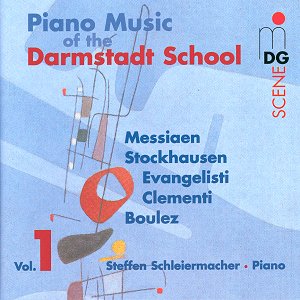PIANO MUSIC OF THE DARMSTADT SCHOOL Volume
1
Olivier MESSIAEN (1908-92) Cantéyodjaya.
Karlheinz STOCKHAUSEN (born 1928)
Klavierstücke Nos. I-V.
Franco EVANGELISTI (1926-80)proiezioni sonore.
Aldo CLEMENTI (born 1925) Composizione No. 1.
Pierre BOULEZ (born 1925) Piano Sonata No.
3.
 Steffen Schleiermacher
(piano).
Steffen Schleiermacher
(piano).
 Dabringhaus und Grimm MDG613
1004-2 [DDD]
[64'19]
Dabringhaus und Grimm MDG613
1004-2 [DDD]
[64'19]
Crotchet

A glance at Steffen Schleiermacher's discography to date reveals that he
lives and breathes the music of our century. His successful series of the
piano music of John Cage is a landmark event (also on Dabringhaus und Grimm),
and other composers recorded include Feldman, Cowell and Earle Brown. Being
a composer himself, he is has the added benefit of having insights into the
creative process itself.
All of this means that he has a belief in and a comprehension of this music
that makes for riveting listening. On the present disc, he inaugurates a
series which centres on one of the most exciting compositional meeting places
of the twentieth century: the Darmstadt Summer Courses, a veritable melting
pot of ideas from the high priests of the avant-garde. Of all the composers
in attendance, the figures of Boulez and Stockhausen possibly loom the largest:
but the disc opens with a piece by one of the founders of modern music, Olivier
Messiaen. His Cantéyodjaya includes many characteristic
features, including birdsong, the use of modes of limited transposition and
non-retrogradable rhythms. Schleiermacher's incredible clarity, his decision
never to shirk away from violence and his intellectual grasp of the structure
of this piece is beyond reproach, the musical layering leading inevitably
to the climax. Within the space of 13 minutes, Schleiermacher has journeyed
a long way from his playfully phrased opening gestures.
Stockhausen's first five Klavierstücke are fragmentary, rarefied
pieces: the rigorous strength of intellect of the fifth is particularly
impressive. Schleiermacher appears to be the ideal medium for this
hyper-expressive world, certainly at least the equal of Wambach (Schwann
310016) or the authoritative Aloys Kontarsky on Sony S2K53346.
Aldo Clementi and Franco Evangelisti represent the Italian contingent that
could not resist the pull of Darmstadt. Evangelisti's output is represented
by proiezioni sonore, which consists of isolated events separated
by gripping, intense silences. Clementi's objectively named Composozione
No. 1 originates from a disturbingly fragmented mind that makes for
compulsive listening.
Finally, Boulez' Third Sonata emerges as a towering edifice. Schleiermacher's
journey through the score (literally so, as there is no one preordained order
to the constituent parts) elicits a complete range of dynamic and touch from
the pianist. It comes as a surprise that Schleiermacher on occasion seems
to literally make the figuration dance, contrasting this with harsh
martellato. The piece ends as if there could indeed be any number
of fragments to follow.
Fascinating, gripping and indispensable are all words that this recital brings
to mind. Not for the faint-hearted, but the rewards are seemingly infinite.
Reviewer
Colin Clarke
Performance

Recording


